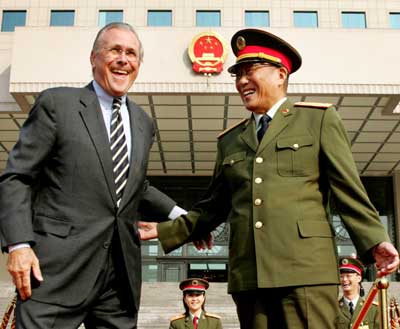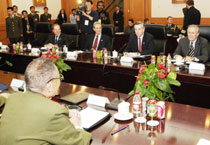|
Pentagon seeks to curb China's military might
(Reuters/chinadaily.com.cn) )
Updated: 2006-02-02 16:31
The Pentagon is seeking to dissuade China from building its military forces
to a level “not warranted” by its security needs, and the issue is addressed in
a new long-term Pentagon plan, a senior U.S. military official said Wednesday.

US Defense Secretary Donald Rumsfeld (L) and
Chinese Defense Minister Cao Gangchuan share a light moment as they attend
a welcoming ceremony at the Chinese Defense Ministry in Beijing October
19, 2005. [File/Reuters] |
Ryan Henry, principal deputy undersecretary of defense for policy, said
Washington wanted to make sure the Chinese "have the forces necessary to provide
for their genuine security needs and not to go beyond that," according to a
Reuter report.
He said the matter was addressed in the Quadrennial Defense Review (QDR), a
blueprint for changes to U.S. strategy and forces due to be sent to Congress on
Monday with U.S. President Bush's fiscal 2007 budget.
However, the Pentagon plan outlines that U.S. own military will be
strengthened with a rising investment bill. In the Pacific, the U.S. Navy will
add at least one aircraft carrier strike group and maintain 60 percent of its
submarines, the Pentagon’s draft plan said.
In addition, the Navy is to double the number of attack submarines it buys to
two a year by 2012. And, the Air Force is to bring forward by up to 20 years its
plan for a new long-range strike capability, according to the draft.
The Bush administration frequently has voiced concern
about China's growing military spending. The Pentagon has questioned China’s
double-digit defense spending increases, supported by a booming Chinese economy.
Its previous reports on China’s military allege China was spending two to three
times more than the $26 billion announced as its defense budget for 2005.

US Defense
Secretary Donald Rumsfeld (R) speaks at the start of a meeting with
Chinese Defense Minister Cao Gangchuan at the Defense Ministry's Bayi
Building in Beijing October 19, 2005.
[File/Reuters] |
According to a draft of the review made available by InsideDefense.com, a
trade publication, the Pentagon is calling for a range of new weapons and
capabilities "to help shape the choices of countries at strategic crossroads."
Michael Pillsbury, an advisor to the Pentagon who is author of two National
Defense University books on the Chinese military, said the U.S. goal was to
discourage China and Russia among others from spending large sums into
"offensive, first-strike systems."
Henry, who advises Defense Secretary Donald Rumsfeld on military strategy and
national security policy, said the United States wanted China "to make what we
would view as the right sort of choices, and that is addressed in the QDR."
He made his remarks at an event sponsored by the Center for Strategic and
International Studies, a private research group, to preview in general terms the
Pentagon review, which is mandated by Congress once every four years.
Policy toward China is only one part of the report, which looks at U.S.
defense strategy over the next 20 years.
According to the draft, which may have been subject to changes, the Pentagon
wants to boost U.S. special operations forces by 15 percent and the number of
special operations battalions by one-third as part of the U.S.-declared war on
terrorism.
|